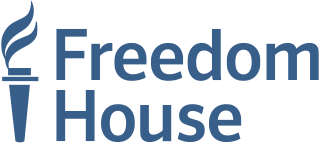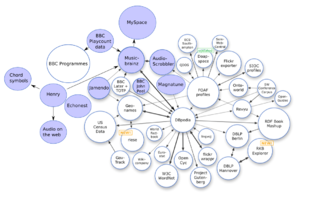Civil and political rights are a class of rights that protect individuals' freedom from infringement by governments, social organizations, and private individuals. They ensure one's entitlement to participate in the civil and political life of society and the state.

Freedom House is a non-profit organization based in Washington, D.C. It is best known for political advocacy surrounding issues of democracy, political freedom, and human rights. Freedom House was founded in October 1941, with Wendell Willkie and Eleanor Roosevelt serving as its first honorary chairpersons. Most of the organization's funding comes from the U.S. State Department and other government grants. It also receives funds from various semi-public and private foundations, as well as individual contributions.

The State University of New York at Binghamton is a public research university with campuses in Binghamton, Vestal, and Johnson City, New York. It is one of the four university centers in the State University of New York (SUNY) system. As of Fall 2020, 18,128 undergraduate and graduate students attended the university.

The National Resistance Movement has been the ruling party in Uganda since 1986.
Labor rights or workers' rights are both legal rights and human rights relating to labor relations between workers and employers. These rights are codified in national and international labor and employment law. In general, these rights influence working conditions in the relations of employment. One of the most prominent is the right to freedom of association, otherwise known as the right to organize. Workers organized in trade unions exercise the right to collective bargaining to improve working conditions.

Open data is data that is openly accessible, exploitable, editable and shared by anyone for any purpose. Open data is licensed under an open license.

Global Peace Index (GPI) is a report produced by the Institute for Economics & Peace (IEP) which measures the relative position of nations' and regions' peacefulness. The GPI ranks 163 independent states and territories according to their levels of peacefulness. In the past decade, the GPI has presented trends of increased global violence and less peacefulness.
The Uppsala Conflict Data Program (UCDP) is a data collection program on organized violence, based at Uppsala University in Sweden. The UCDP is a leading provider of data on organized violence and armed conflict, and it is the oldest ongoing data collection project for civil war, with a history of almost 40 years. UCDP data are systematically collected and have global coverage, comparability across cases and countries, and long time series. Data are updated annually and are publicly available, free of charge. Furthermore, preliminary data on events of organized violence in Africa is released on a monthly basis.

The Ibrahim Index of African Governance (IIAG), established in 2007, provides an assessment of the quality of governance in African countries. The IIAG is compiled by 81 indicators and 265 variables from 54 data projects, coming from 47 independent African and international data sources. Published every two years, the IIAG is one of the world’s most comprehensive collections of data on African governance.
David Cingranelli is a professor of Political Science at Binghamton University. He received his Ph.D. from the University of Pennsylvania in 1977. He conducts global, comparative, econometric research examining the causes and consequences of variation in government respect for various human rights. His 2007 book with Rodwan Abouharb, Human Rights and Structural Adjustment, demonstrated the negative human rights impacts of World Bank and IMF program lending in developing countries. His current research examines how constitutional design and other factors can provide incentives to politicians to enact policies protecting human rights including labor rights. He is a former president of the Human Rights Section of the American Political Science Association. Until 2013, he served as the co-director of the Cingranelli and Richards (CIRI) Human Rights Data Project.
This list of Internet censorship and surveillance by country provides information on the types and levels of Internet censorship and surveillance that is occurring in countries around the world.
The Worldwide Governance Indicators (WGI) is a project that reports both aggregate and individual governance indicators for over 200 countries and territories covering the period from 1996 to 2021. It considers six dimensions of governance:
Anocracy, or semi-democracy, is a form of government that is loosely defined as part democracy and part dictatorship, or as a "regime that mixes democratic with autocratic features". Another definition classifies anocracy as "a regime that permits some means of participation through opposition group behavior but that has incomplete development of mechanisms to redress grievances." The term "semi-democratic" is reserved for stable regimes that combine democratic and authoritarian elements. Scholars distinguish anocracies from autocracies and democracies in their capability to maintain authority, political dynamics, and policy agendas. Similarly, the regimes have democratic institutions that allow for nominal amounts of competition. Such regimes are particularly susceptible to outbreaks of armed conflict and unexpected or adverse changes in leadership.
The Political Terror Scale is a yearly measure of state-inflicted political terror. It was developed in the early 1980s by researchers at Purdue University and is currently managed by Mark Gibney of the University of North Carolina at Asheville.
Internet intermediary refers to a company that facilitates the use of the Internet. Such companies include internet service providers (ISPs), search engines and social media platforms.

Media freedom in the European Union is a fundamental right that applies to all member states of the European Union and its citizens, as defined in the EU Charter of Fundamental Rights as well as the European Convention on Human Rights. Within the EU enlargement process, guaranteeing media freedom is named a "key indicator of a country's readiness to become part of the EU".
The V-Dem Institute, founded by Staffan I. Lindberg in 2014, studies the qualities of government. The headquarters of the project is based at the department of political science, University of Gothenburg, Sweden.

The Democracy Indices by V-Dem are democracy indices published by the V-Dem Institute that describe qualities of different democracies. This dataset is published on an annual basis and is publicly available and free. In particular, the V-Dem dataset is popular among political scientists and describes the characteristics of political regimes worldwide. In total, datasets released by the V-Dem Institute include information on hundreds of indicator variables describing all aspects of government, especially on the quality of democracy, inclusivity, and other economic indicators. An R package automatically bundles new data.







